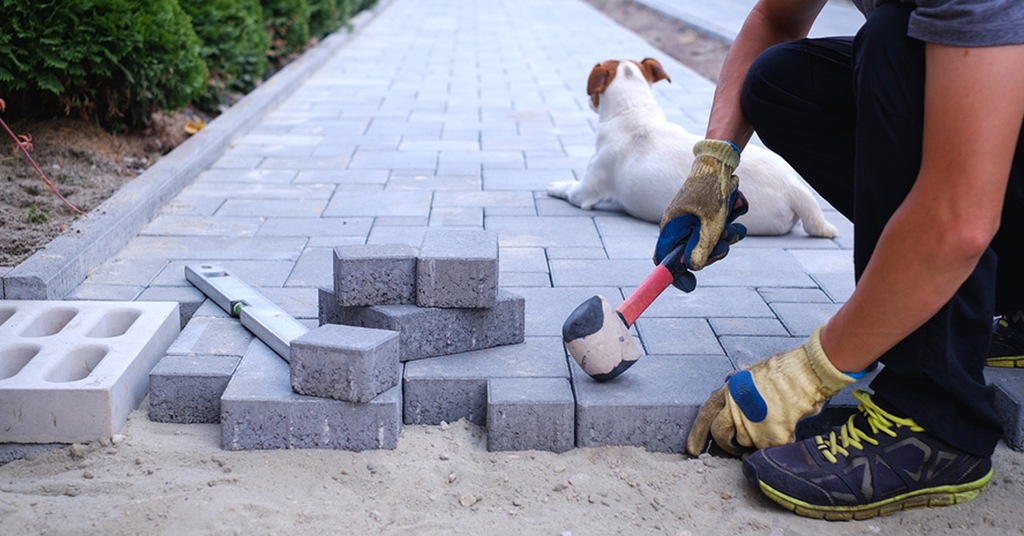Are you in the market for a new driveway? Whether you're building a new house or replacing an existing driveway, it's worth considering what material you should use. Even if you've had the same type of driveway your whole life, you might find that another material would better suit your current needs.
Check out these five types of driveway surfaces so that you can make an informed decision about what material to use for your next driveway project.
Asphalt
Asphalt (sometimes called blacktop) is an ideal driveway material because it's affordable and durable. When you install an asphalt driveway and care for it properly, you can expect it to last about 15 years. Some asphalt driveways last even longer!
To learn about the process of installing an asphalt driveway, check out this video:
Asphalt is one of the best types of driveways for cold climates. Winter's freeze-thaw cycle can be rough on paved surfaces and cause cracks and other damage. However, asphalt's natural flexibility helps it withstand many of these pressures. Concrete and other materials may not be able to hold up as well through the winter.
If your asphalt driveway does end up with cracks or holes, repairs are relatively easy. Many cracks can be patched. Sealcoating the driveway every few years restores its original black color and protects the surface. Sometimes (when the foundation is stable) there is the option of resurfacing the asphalt which allows you to fix major damage without completely starting over with a new driveway.
Quick Facts About Asphalt
Poured Concrete
Another popular option among the various types of driveway surfaces is poured concrete. A concrete driveway can last for decades. However, that sort of longevity comes at a cost; concrete is one of the higher-priced driveway materials.
However there are maintenance cost associated with concrete driveways as well. If the driveway breaks, it can be quite tricky to repair. Patching the material leaves obvious marks behind. Broken spots that are too big for patching may need to be torn out and entirely redone.
Learn more about caring for a concrete driveway in the following video:
Quick Facts About Poured Concrete
Gravel
The most common type of loose aggregrate used for driveways is gravel. To make a gravel driveway, small stones are poured onto the driveway area. These loose stones are spread evenly to create a surface on which to drive.
Gravel driveways are appealing to those who want the cheapest driveway solution. Of course, you can't expect them to hold up as long as a paved driveway, such as one made of asphalt or concrete. Gravel driveways have a rougher appearance than blacktop driveways.
Gravel driveways do require maintenance. Gravel is particularly tricky in snowy climates. Plowing or shoveling snow can dislodge much of the gravel, and that can leave you with a bare or patchy driveway.
Another problem with gravel is that it doesn't do a great job of preventing grass and weeds from growing through. You may need to pull vegetation frequently or regularly apply grass killer.
Quick Facts About Gravel
Paving Stones
When it comes to paving stones, there are no shortage of options available. Common choices include brick, cobblestone and flagstone. These natural and manmade stones come in a wide variety of colors. Brick and cobblestone are particularly useful for laying in interesting decorative patterns.
Although paving stones can be quite beautiful, homeowners often shy away from this material because it's not cheap. In fact, it's often the most expensive of the various types of driveways.
One reason that paving stones make for expensive driveways is that laying them can be a time-consuming process. It's very important to ensure that the foundation is level and that blocks are lined up properly. Professional installation can make a big difference in how the final product turns out.
One benefit to driveways made with paving stones is that upkeep can be easy. The blocks may crack over time. However, performing a repair may be as simple as swapping out one brick for another.
Quick Facts About Paving Stones
Oil and Stone
Oil and stone, also known as chip and tar, is a happy medium between a blacktop surface and gravel. Once the driveway area has been prepared, a coat of hot oil is applied with a special sprayer attachment. Natural stone is then installed (raked by hand) over the hot oil creating a bond to hold the stone in place. A roller compacts the stone for further strength. It must be noted that stone driveways have a rough appearance. There are some stones that do not touch the oil and so there will be movement in the surface. Regular maintenance is required to keep the stone in the driveway. Blue stone and pea gravel are two (2) popular stone choices on Long Island.
Oil and stone is economical, but it's not the most durable type of driveway. The oil coating will probably help it last longer than a gravel driveway. However, because the stones often work their way loose, it won't hold up as well as an asphalt surface. Snow Plowing can be especially rough on it.
Quick Facts About Oil and Stone
Which of these types of driveway surfaces sounds like the best fit for your property? You may find that the affordability, durability and flexibility of asphalt lead you to choose this material for your next driveway installation. Or you may decide to try another surface such as concrete or oil and stone. No matter which surface you are interested in, and to learn more about the benefits of professional driveway installation, contact our team at PALERMO PAVING (located in Bellport NY) today!

